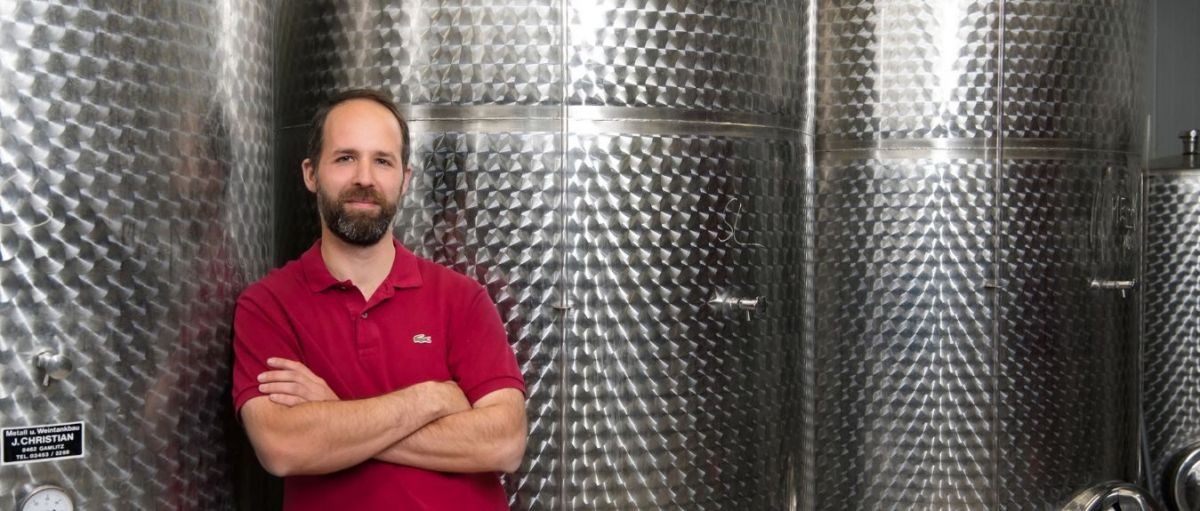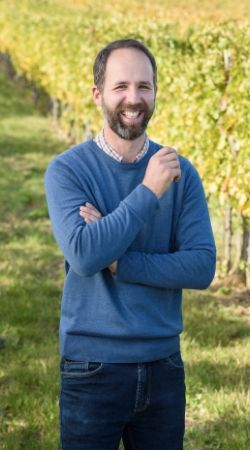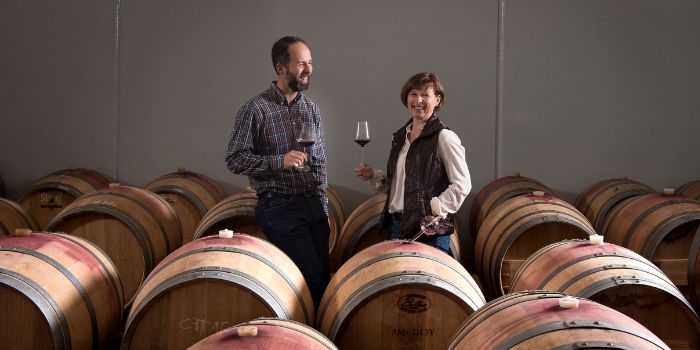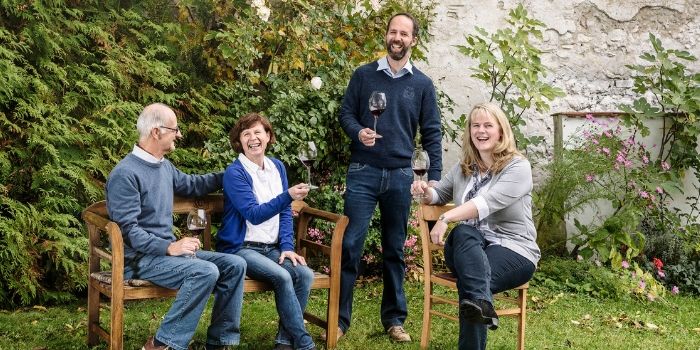Warehouse
Deadline
July 10, 2026
Judging
Date
July 27, 2026
Winners
Announced
August 12, 2026

He is a man of few words, serious, a bit rough around the edges, but with a lot of soul, depth and once you get to know him better, you are no longer surprised by his warmth and playful side.
All these attributes you can equally find in the wines he is creating and the landscape that surrounds him.
But who is this person and where are we?

Let's start with the area we find ourselves in – Burgenland, the most eastern part of Austria, on the border to Hungary. In it, we find a small village called Horitschon in the wine-growing region called Mittelburgenland. The village and the region have dedicated themselves to mainly one grape – Blaufränkisch, known as Lemberger in Germany and Kékfrankos in Hungary.
The perfect terroir and climate allow the grape to develop its typical dense structure, prominent tannins, and deep, berry fruit, along with a fresh minerality and elegance. Hills and woodland that protect the vineyards from the elements, dryad warm winds blow gently from the east. The soils are predominately dense, loamy and water-retentive, which allows wines with structure and body. But you can also find vineyards dominated by gneiss, schist, and limestone.
The winemaker we are talking about is Christian Mayrhofer, who has recently taken over his parents' winery Domaine Mayrhofer and together with his wife is taking on the challenge of leading this family business.
He had good preparation to do so – graduated from a school for tourism and business, where he could learn the theory how to manage and run a business, he ventured out from his small home town into the big world. He traveled to California, Australia, France, and New Zealand, where he worked as an intern at a winery. He collected valuable impressions on these trips that slowly but steadily formed his own ideas of how to approach wine growing, rather than winemaking. Especially one experience in the Rhône valley left deep traces – he tasted wines from over 90-year-old vines. This experience, in particular, stuck with him. One of the pillars of his philosophy is to treat his vineyards with the utmost care and respect in order to give them the longest possible lifespan and health, so they grow wines with enormous character, countless facettes, and longevity that can not be found in younger vines.

He strongly believes that wine should mirror their environment, they come from, the particular vineyard the grew in. Flora, fauna and of course, climate factor into this, too, and Mayrhofer provides his vines the biggest possible freedom to incorporate these factors. He prefers to guide the vines along on their way and not to interfere too much. All the work in the vineyards is done with the utmost care and 100% manually. This results in wines sublimely elegant, mineral wines, that are never overboarding or loud and invite the drinker to take their time to understand and appreciate them. To underline this tight bond with nature and his philosophy he got the winery certified as a sustainable company.
We met the winemaker to asked him to give us a glimpse of his work, philosophy, and the challenges he is facing.
A: Until I have taken over we could run the winery with seasonal helpers, mainly during harvest. I was out in the vineyard and in the cellar, mother handled the office work. These times are coming to an end. Seeing my office work piling up, I am going to restructure and hire people whom I can hand over such tasks. As for me, being close to the vines will always be a priority. Finding the right people who share my philosophy and approach is quite a challenge though! Of course, it was not too easy for my parents to let go but they trust me and are happy to see the changes and where the winery is going under my leadership. Living in the same house with them proofs to be quite convenient, as they are now able to dedicate their time to my little son.
A: Being solely responsible for all steps along the way I see much better now where I have to make changes. Marketing my wines is something I never really did before and the former structure of our company did not involve extensive marketing or sales strategies and projects. You can have great results by not interfering too much in the vineyard and wine cellar but when you want to win new clients and promote your products, this does not apply at all. Austria is still a very traditional country when it comes to wine marketing, and so being present at tastings and wine fairs are very important. As of now, the bigger part of my clients is of a certain age, it is important to them, that there are not too many changes happening too fast. Keeping this balance – trying to win new clients and still being able to keep the regular ones who have already been buying from my parents is an interesting challenge.
A: Tradition lives on innovation! I have always been trying to make little changes here and there, especially in the vineyards as I was always keen to implement my own approach and philosophy. It is not necessary to reinvent the wheel in agriculture, but being open-minded and also being able to adapt to changes around you, whether it is the climate, or what clients demand, is imperative. And never to lose focus and sensibility. I don't believe in exaggerating things.

A: Marketing experts will truly answer this with YES! I don't necessarily believe so. In my case, it was more of a coincidence that the re-branding and handing down overlapped.
A: Talk to as many designers as you can. Find the one who really understands what you are looking for and when the new design you work out together feels right, all you need to do is communicate it. Changing your labels, wine style and introducing new wines at the same time can be an advantage, as you work with the comfort of your infrastructure, you know what is possible and you can focus on transporting it and communicating it to your clients. If you have done your homework in the phase before re-branding, you should have a buffer that helps you through the transitional period. And luck, you also need luck like in all business ventures.
A: I have never been a friend of these things, to be honest. I don't feel I lose out on business opportunities, just because I don't have an Instagram account. In fact, I only own a smartphone since last year. I think everybody has to decide for themselves how much they want to be exposed to the additional stress that the digital world provides. Not joining the craze in these times of acceleration and with people being on call 24 hours a day is liberating and satisfying and gives me time to focus on my priorities.
A: I always listen to my clients. They are well informed and I discovered a few new wine trade shows through them, which I will attend this year. There is an abundance of fairs and tastings these days, but ultimately it is the client who decides, which ones are worth attending. And these are the ones you need to present yourself at. When the clients find themselves in an environment that feels good, you will have more success in selling your product.
I also recently registered my winery on Google Ads and I am curious to see how much of an impact it is going to make on our sales figures. But I will not check my phone every hour to find out, rest assured of that.
A: Size and structure are of course, totally different from what we work with here. And yet I found that also in the New World and on these big estates, people work with tradition and have similar approaches and philosophies. Some steps are different and I try to incorporate them in my daily work. The climate I found out, is an issue there, same as here.
A: Of course you need to earn, you have your liabilities and you must also create savings to invest in your winery, new equipment, etc. I try to always have in the back of my mind, that potentially every year, every wine season something can happen that puts you in the situation of not having much or even any wine to sell. This might sound negative, but it helps me to keep grounded and thankful and never act irresponsibly. If you love what you are doing, you will get through such hard times, you fall, you stand up, dust off your wellies and march out into your vineyard to see what's left and you start all over again. Every loss is also a moment of contemplation that shows you-you don't only live off our wine, you also live for it. And that helps to look forward and not losing courage.
A: I was lucky and could choose, my parents never put any pressure on me to become a winemaker. I worked in hospitality and wine retail, but I feel lucky to at last have chosen agriculture. Every year I get the chance to prove myself and that drives me. Whatever my son one day is going to do, is up to him. I will not force him into the wine world. Of course, the wine will inevitably be a part of his life, because it is what he sees every day. But if he chooses a different path I will not stop him. In the meantime I will do my best to keep my business successful because one thing is sure: a flourishing business is more tempting to take over!
Grow your wines in the off-premise channels of the USA. The Early Bird submission deadline is February 20, 2026, and the domestic submission deadline is June 30, 2026. Here is how to enter.